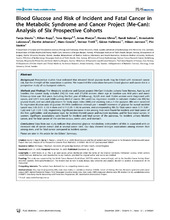| dc.description.abstract | Background: Prospective studies have indicated that elevated blood glucose levels may be linked with increased cancer risk, but the strength of the association is unclear. We examined the association between blood glucose and cancer risk in a prospective study of six European cohorts. Methods and Findings: The Metabolic syndrome and Cancer project (Me-Can) includes cohorts from Norway, Austria, and Sweden; the current study included 274,126 men and 275,818 women. Mean age at baseline was 44.8 years and mean follow-up time was 10.4 years. Excluding the first year of follow-up, 18,621 men and 11,664 women were diagnosed with cancer, and 6,973 men and 3,088 women died of cancer. We used Cox regression models to calculate relative risk (RR) for glucose levels, and included adjustment for body mass index (BMI) and smoking status in the analyses. RRs were corrected for regression dilution ratio of glucose. RR (95% confidence interval) per 1 mmol/l increment of glucose for overall incident cancer was 1.05 (1.01–1.10) in men and 1.11 (1.05–1.16) in women, and corresponding RRs for fatal cancer were 1.15 (1.07–1.22) and 1.21 (1.11–1.33), respectively. Significant increases in risk among men were found for incident and fatal cancer of the liver, gallbladder, and respiratory tract, for incident thyroid cancer and multiple myeloma, and for fatal rectal cancer. In women, significant associations were found for incident and fatal cancer of the pancreas, for incident urinary bladder cancer, and for fatal cancer of the uterine corpus, cervix uteri, and stomach. Conclusions: Data from our study indicate that abnormal glucose metabolism, independent of BMI, is associated with an increased risk of cancer overall and at several cancer sites. Our data showed stronger associations among women than among men, and for fatal cancer compared to incident cancer. | en_US |

